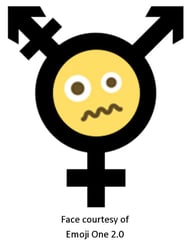 Consider this sentence: Ask your friend if they want to join us for dinner.
Consider this sentence: Ask your friend if they want to join us for dinner.
If you’re among those who would automatically change they want to he or she wants, you’re about to shudder (or perhaps become apoplectic). Last week, the American Dialect Society (ADS) announced that singular they is its Word of the Year for 2015.
Never mind that singular they is already common in American speech … or that Shakespeare and Jane Austen regularly used it … or that last year the Washington Post style guide officially adopted this aberration. You know in your heart of hearts that it’s just plain wrong.
And because ADS members include linguists, lexicographers, etymologists, grammarians, historians, researchers, writers, editors, students and independent scholars, you might be thinking their choice is the beginning of the end of the English language as we know it.
Relax. Let’s look at the facts.
- English has no gender-neutral third-person singular personal pronoun.
Alternatives to he and she have been proposed along the way, but none have stuck. Most would agree that using he to encompass everyone is sexist and that using she for the same purpose is self-conscious. And using he or she or variations thereof (he/she, s/he) can become awkward, or even ridiculous, in a sentence that uses multiple personal pronouns:
The teacher required each student to write his or her name at the top of his or her paper before submitting it.
We can easily avoid the problem here by rewriting the sentence:
The teacher required all students to write their names at the top of their papers before submitting them.
But that’s not always the case.
- Being named Word of the Year doesn’t cast the word or usage in stone.
ADS acknowledged that, in conducting the vote, its members “do not pretend to be officially inducting words into the English language. Instead, they are highlighting that language change is normal, ongoing and entertaining.” Even if you don’t like it.
The fact that singular they, which has been around a long time, has just been named Word of the Year is more reflective of its newer, and intentional, usage to refer to someone whose gender identity is nonbinary. Caitlyn Jenner made gender identity a hot topic in 2015, which brought about discussions of how to refer to individuals who identify themselves outside the traditional male/female model.
- Let context be your guide.
If you’re writing a formal document and want to follow traditional English conventions (which is probably wise), he or she is certainly appropriate (although a better approach would be to use plural subjects or rewrite the sentence if possible to avoid such awkward constructions).
In speaking or more informal writing, singular they is acceptable if you don’t know the person’s gender … and sometimes even if you do (especially in speaking).
But if you’re writing about someone who identifies as something other than male or female, singular they is unequivocally the best choice — at least for now.




